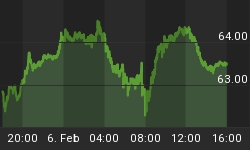Elliott Wave's Bob Prechter, one of the most well known deflationists, once produced a chart comparing the financial markets to the trends within popular culture. At the top of a bull market, a sense of optimism & giddiness prevails with popular culture spitting out bubblegum music, short dresses and boybands. At market bottoms, the chart-topping music turns depressing, dresses are longer and cultural optimism cannot be found.
Just take a look at the late 1990s for example. Female hairstyles and dresses kept getting shorter. After several years of depressing or "grunge" music from bands such as Nirvana and the Grateful Dead, cheesy pop music came back in force. First it was boybands such as the Backstreet Boys and 'N Sync. Then the bubblegum came with acts like Britney Spears and Ricky Martin.

By 2003, after the stock market returned to earth, most of the boybands had disappeared. It seemed that the social gaiety of the 1990s had disappeared along with everyone's 401(k)s. The previous year had been filled with constant news stories about war, terrorism, duct tape and plastic sheeting. During the weeks leading up to the Iraq war, there was genuine fear among the public that something was going to happen on American soil. It was almost as if survivalism was making a comeback. We can recall news stories about companies offering to build bunkers and fallout shelters for concerned citizens.

As the bombs began dropping on Baghdad, the stock market started to climb again. Any remaining fears of NBC (nuclear, biological & chemical) terrorism were going away. Fears of disaster peaked around the time the market bottomed. The orange alerts issued by the Department of Homeland Security became less frequent. It looked like things were getting back to normal. The economy had indeed began to recover as jobs started to return ever so slightly (thank you birth/death model manipulation). One trend that began to get attention was the resilient real estate market. People had lost their money in the "paper" stock market, but now they wanted to own something "real", and property was their answer. All of those who tried to make a quick buck in the 1990s as stock brokers or financial advisors became mortgage brokers or real estate agents. By 2004, one of the fastest growing industries in America was the real estate sector. Donald Trump's name skyrocketed to the stratosphere of popular culture with his hit show depicting apprentices trying to become the next real estate mogul. Real estate had become the new NASDAQ. And now, after a five year hiatus, the Backstreet Boys are out with another album. Financial bubbles and the popularity of cheesy boybands seem to be inexplicably linked.
If one were to look at nothing more than sentiment in real estate these days (gracing the cover of Time) and the widespread belief among the average Joe that property only appreciates - it sounds like a market top to us. Throw on the scary fundamentals beneath the real estate boom, namely shoddy lending standards, peak home ownership rates, and large percentages of 2nd home and "investment" (read: speculative) purchases and the top, if it hasn't already happened, should be fairly close. Though the ensuing real estate collapse may not be as epic in percentage terms as the NASDAQ, in places such as California and the East Coast we think a 20 or 30% decline could happen almost overnight, which given the leverage used by most homeowners could spell disaster for the rest of our economy.















